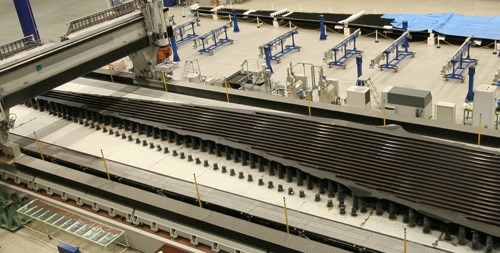A composite wing giant is born
With the decision to build the carbon fiber wings for the 777X in Everett, Wash., Boeing is joining a short list of big composite wing manufacturers and establishing itself as a major composites fabricator for many years to come.

As Boeing announced today that manufacture of the carbon fiber wings for the 777X will be located in Everet, Wash., that sound you heard was every automated tape layer (ATL) and automated fiber placement (AFP) machinery manufacturer packing up his or her wares and heading to Washington in the hope of placing a few million dollars worth of equipment in the soon-to-be built plant.
Actually, the question has not been if Boeing's composite wing facility would be located in the Seattle area, but where. When the International Association of Machinists & Aerospace Workers (IAM) District 751 approved an eight-year contract extension earlier this year, Seattle immediately became the epicenter of a great deal of composites fabrication work for a very long time as Boeing looks to upgrade the tried and true 777 with, among other features, carbon fiber wings.
In the process, the Boeing Everett facilty joins a very short list of global carbon fiber composite wing manufacturing plants capable of producing structures the size of those required by the 777X. Already on the list are Mitsubishi Heavy Industries in Japan, GKN Aerospace in England, Airbus in Germany and Spain, AeroComposit in Russia and Spirit AeroSystems in the U.S.
Making composite wing boxes, wing skins and leading and trailing edges is no trivial matter, and Boeing is signalling loud and clear that it will invest in the capital equipment and people required to get the job done. In the process, it seems likely that a few of those IAM machinists who have been used to cutting and drilling steel and titanium might be asked to start laying down, trimming and drilling carbon fiber instead. Which, it is supposed, they will gladly do.
This augers well for the use of carbon fiber composites in the wing of a 737 replacement, and sheds light again on the question lingering over the aerospace composites industry: Will composites find a home in the fuselage of a 737 replacement (or the fuselage of an Airbus A320 replacement, for that matter)?
Stay tuned.
Related Content
-
Next-generation airship design enabled by modern composites
LTA Research’s proof-of-concept Pathfinder 1 modernizes a fully rigid airship design with a largely carbon fiber composite frame. R&D has already begun on higher volume, more automated manufacturing for the future.
-
Infinite Composites: Type V tanks for space, hydrogen, automotive and more
After a decade of proving its linerless, weight-saving composite tanks with NASA and more than 30 aerospace companies, this CryoSphere pioneer is scaling for growth in commercial space and sustainable transportation on Earth.
-
Plant tour: Joby Aviation, Marina, Calif., U.S.
As the advanced air mobility market begins to take shape, market leader Joby Aviation works to industrialize composites manufacturing for its first-generation, composites-intensive, all-electric air taxi.














.jpg;maxWidth=300;quality=90)

